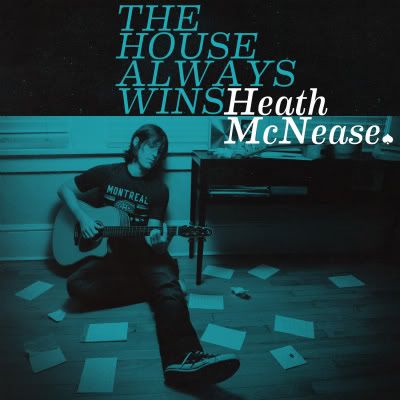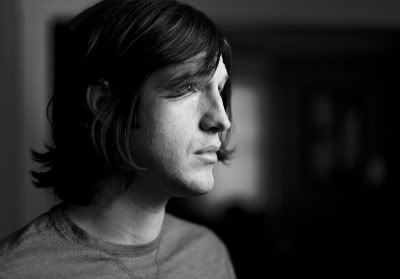Tuesday, February 22, 2011
Heath McNease Takes a Break from Hip Hop with New Acoustic Pop Record
I recently caught up with Georgia-based Christian rapper Heath McNease via e-mail to discuss his new album, the art of freestyling, and the how he keeps his faith when on the road for over 300 gigs a year.
Sketch: When somebody asks what kind of music you do what do you tell them?
Heath: I tell them I'm an emcee and a singer songwriter. I do hip hop and I do singer/songwriter solo material.
Sketch: You do both worship music and hip hop. Do you find much crossover between those audiences?
Heath: Definitely sometimes. I honestly think some people are more impressed by that than they should be. I never set out to do two different styles of music because I wanted to be "different" or to have a comfortable niche to rest in..."look he raps AND he plays instruments AND he sings." I don't think that's a cool concept to lean on, because you can do all three and be mediocre at them and it doesn't help your cause.
Wyclef Jean [from The Fugees] was doing this before anybody, so it's not an original idea. My goal has always been to make great music - to make great rap and great acoustic stuff, so I definitely find a lot of crossover, but I think sometimes it isn't for the right reasons. We’re in a time where people listen to every different genre under the moon and stars and they can go from rap to pop or folk in seconds. So it isn't impressive that I do multiple things musically because their iPod does the same thing.
I think I could possibly see how they find it impressive live when I'm freestyling/playing guitar, piano, and harmonica/doing worship/covering songs, but I don't think that being a fan of an artist because they can do multiple things musically is necessarily the best promotional tool to use.
Sketch: Do see some of the same faces at both types of shows or do you perform both types of music at one show?
Heath: I definitely see some of the same faces. I integrate and keep it separate depending on what the venue wants. I play rap clubs and venues where I mostly just rap. I do coffee shops and lead worship and only play and sing. But most of my regular concerts include a heavy selection of both.
Sketch: Often your hip hop seems to lean heavily on humor and "nerdcore" type references. Why is that?
Heath: I'm not sure I've ever truly understood the "nerd core" deduction. I'm not saying I disagree with it when people say it...or take exception to it. I'm just not sure I understand it. It comes up in a lot of reviews and it's always used in a positive light but I'm not sure what the end game is there. I mean, on a rap album of mine with 15 tracks, probably seven or eight of them are feel good songs, three or four are more serious bangers, and the rest is usually incredibly serious and lyrically dense subject matter that exposes a lot of urgent and pressing material. I think sometimes it is easier for people to put me in the "clown prince, nerdcore, silly" category because I have a lot of fun on my albums and when playing live but I think that is sometimes a function of the fact that 98% of hip hop is far too serious/bland/uninteresting/formulaic/safe and because everything sounds the same
My material tends to stick out a little more for its humorous approach because there aren't a lot of emcees or artists who really tackle humorous material without going into full out cartoonish devices which I avoid with a few exceptions here or there because there are definitely times for blatant silliness.
But I like to make people laugh. I like to give people a great time a show and have them leave feeling optimistic about life for five minutes before the next war breaks out or celebrity gets arrested or family member gets sick, etc. We need to escape sometimes. But all the humor really does is serve in the process of opening people up to the serious things I'd like to share. It is a give and take.
My music is a lot like someone's life would sound - tons of joy...tons of happiness...lots of sorrow...lots of worry. So I don't think I've ever "leaned" on humor or any other device. It's just a natural manifestation of how I choose to communicate both musically and interpersonally.
Sketch: Why did you decide to take a break from hip hop on The House Always Wins?
Heath: I definitely wasn't taking a break from it. It just seemed like the right time for me. When I am writing/producing/recording/mixing/mastering hip hop projects it takes so much out of me. The creative process can be a long one, because I never allow myself to come with anything less than my absolute best.
It takes time to really build songs with the heavy syllabic structure that I have in cooperation with the mixture of both live and sampled instrumentation and then the engineering phase is ten times as brutal with none of the fun. So while I'm working on hip hop or while I'm on the road these acoustic songs just find their way out of my heart.
I think the greatest difference between any other kind of music and hip hop is that with hip hop your words tell a vivid story. You can describe every detail down to the last thread. You can sometimes beat a dead horse before you even get to the third verse. With acoustic/pop/rock/indie music there is so much more of an opportunity to abstract your thoughts and ideas. You can try to capture a "mood" without thoroughly expressing a full idea and I've found that sometimes that speaks to me louder than 48 bars worth of storytelling.
It's just a great blessing that I have been given the opportunity to explore both sides of that communication musically. I just thought it was time for less lyrics and more mood. So this album essentially wrote itself.
Sketch: Which type of music do you find more challenging to write: hip hop or acoustic pop? Why is that?
Heath: Hip hop because of the lyrical content. It's just a lot more difficult to be both deep, interesting, stylish, and captivating when your words are your entire form of communication than in pop or indie music where music, lyric, and sometimes just sounds like "ooooh", "ahhh", and "dah dah dah" and can take on a character of their own. That's a lot less writing. It's more about feeling it out and a lot like the saying in poetry classes -"Less words, more poem." That's how pop is.
Sketch: Which comparison do you get and hate more: "the Christian Eminem" or "the Christian Jack Johnson?"
Heath: Geez, I'd say it's about equal. Although the "Christian" part doesn't come up so much, especially when I'm playing outside of a church which I do a lot of. I think comparisons make some artists upset but I understand that we as people have it built in our system to want to classify and qualify. It's just a shorthand that we all speak.
Sketch: You're a part of the "Whose Rhyme Is Is Anyway?" hip hop improv tour with Atlanta's Manchild (of Mars Ill) and Dallas' Playdough. Tell me a little bit about how that got started and how it's been received so far.
Heath: It has been received so well. It's just a ton of fun, man, getting to freestyle and play shows with two guys that I grew up listening to. I mean. I was in high school idolizing these guys. Now I get to swap freestyles back and forth with them? It's amazing.
Audiences love it, dude. They eat it up. Fans of rap, newbies, old, and young, colleges, clubs, churches, etc. we play everywhere and it's a blast. Having a show build solely on the art of freestyle and improv is just a great experience because the audience gets to not only help dictate what you rhyme about, but they get to watch you sweat it out. Manchild and Playdough are two of the dopest freestylers out there and I would put their skill up against anybody's. I'm just happy to be a part of it.
I'm not necessarily the biggest "purist" when it comes to hip hop, but I do feel the art of freestyle has truly been forgotten. I guarantee that 99% of the guys that rap in the mainstream couldn't hold down a topic-based or centrally-themed freestyle for more than four bars. They would go into the clutches of "rippin the mic" or "gettin paid" or whatever it is that rappers say. Freestyle is both a gift and a chore. You have to work at it to continue to be comfortable enough to just let your mind take over. The three of us do that very well at this point.
Sketch: You told me you've done about 300 shows in a year and I know you have a hectic travel schedule. How do you maintain your faith and grounding when you're on the road so often?
Heath: Great question, man. Sometimes it's tough...just like a regular 9 to 5 life is tough. But I think the greatest asset for me is that I get to have a church home multiple days a week even though it's not MY church. I get to see how God is working in the lives of cities and towns all across the country and that increases my faith in a way that being stationary couldn't.
Seeing the church truly be a haven and shelter for people who are broken, sick, poor, and just in general need...that's been awesome. Watching the body of Christ help others because we were mandated to LOVE...not just to try to convert people.
That's one of the toughest parts of Christianity for some people - learning how to love people for their sake without trying to use your means as an end to "save" them. "Let your light so shine so that they might see your good works and glorify your Father which is in heaven."
We are supposed to shine and love and that makes being on the road incredibly uplifting instead of negatively distracting. Plus, having close, air tight accountability with some very close friends in my life keeps me focused on the true goal.
The House Always Wins is available today at all major digital outlets including iTunes where it is listed as an extremely affordable $4.99.
And right now SphereOfHipHop.com is offering Heath's The Gun Show rap album as a free download. Click here to grab your copy.
Labels:
acoustic,
Christian hip hop,
freestyle,
Heath McNease,
pop,
The House Always Wins
Subscribe to:
Post Comments (Atom)







No comments:
Post a Comment